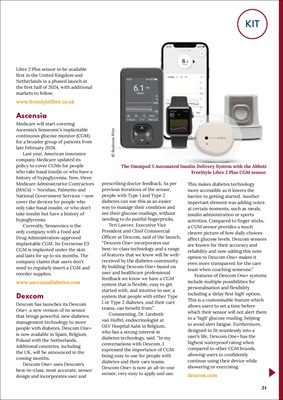
21
LIVING
I
visited the Kent-based
headquarters* of the charity
Hypo Hounds early in January
2024. It's the second dedicated
charity trainer dogs to detect blood
glucose highs and lows that I have
had the pleasure to go to and meet,
having run another interview in the
February 2017 issue of this magazine.
This charity's calling is more niche,
as it's mainly focused on assisting
children with Type 1 diabetes, as they
are less able to communicate their
experience and having a dog on hand
to sniff them out is a huge relief, both
to them and their parents or carers.
And this niche is due to the
founder's own experience as the
mother of a child diagnosed with
Type 1 diabetes. Her daughter Sophie
diagnosed at the age of nine and she's
21 now. The health and welfare of the
dogs is paramount - if they are not
in top condition, they can't do their
job. So, after 10 years watching over
Sophie, hypo hound Scooby is retiring
and Dori will replace him. As a result,
Pearman says, "Sophie feels both
independent and safe."
Best friend
In a recent social media by Pearman,
she expresses how wonderful it's
been to have Scooby ('Scoob') on
the scene - and on the job. She said,
"Many know me as the founder of the
diabetic-alert assistance dog charity,
Hypo Hounds. I am a very proud
mum of a Type 1 diabetic. Diagnosed
at the age of nine, I admit to being
overwhelmed, overworked and
paranoid when looking after her. The
scary stories of children dying in their
sleep simply petrified me and led me
to be up all night. I was exhausted,
it affected everything from work to
relationships, my health, along with
impacting on my son too. I owe this
dog more than I can ever give him, he
has given me my child back, and my
life back. Because of him there are
now more children with diabetes out
there with a best friend. Scoob, you
are a superstar."
While I was visiting, another
group of people was there who had
raised funds and gave the charity a
donation. There were seven women
there from The Order of Women's
Freemasons, Gravesend, one of whom
had Type 1 diabetes. Already in her
70s, she's had Type 1 diabetes for 13
years, so arrived relatively late to this
particular game. She was on a sensor
but said that she was 'not particularly
stable', but that her friends with her
on that day now know when she was
going low by her showing certain
signs, like shaking or failing to finish
a sentence, losing track of what she
was saying. They know how, and
when, to tell her to eat something.
As part of the morning's schedule,
there was a demonstration showing
how the dogs pick up the scent of
a hypo. Pearman's career had been
with the police at the time of her
daughter's diagnosis. There on the
day were the two hypo dog trainers
and handlers, both ex-police doghandlers. A volunteer
sat in a room
that had a glass wall, so we could
all see the demo. She was given
a small canister containing a gas
developed to smell like a hypo, took
the top off and kept it in a trouser
pocket. The dog, Dori, was allowed
in and immediately started to sniff
around, homing in on the volunteer.
Within a couple of minutes, the dog
had 'told' the trainer that there was
something that needed attention in
the room by jumping up (the dog's
'tell') and then identifying the pocket
the canister was in, to the delight of
everyone watching.
Game, set and match
Pearman explains, "So much of what
we do is about the training of the
dogs, but to an extent it's about
matching them to the client. For a
start, the dogs are selected at puppy
level. We do work with breeders, but
we pick the most likely to succeed
from each litter. All the puppies are
Matching children with Type 1
diabetes to specifically-trained
hypo- and hyper-alert dogs,
bringing confidence to their lives as
their safety is improved.
Sponsor a dog or donate as you can.
Either CLICK HERE or scan the QR code.